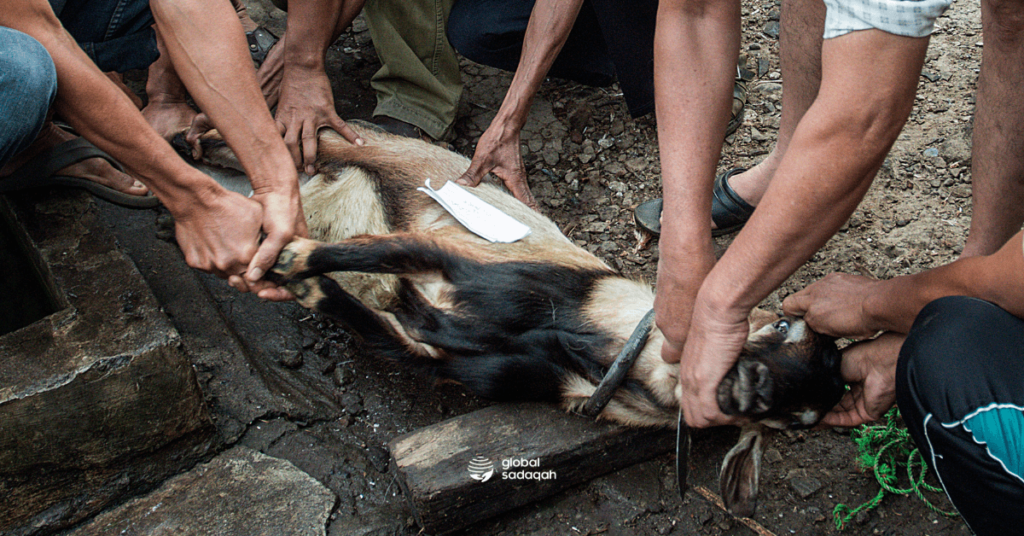Once again, we inch closer to the blessed month of Dhul Hijjah, the month where Muslims across the globe perform Hajj and offer udhiyah, qurban or korban, the sacrifice of four-legged animals for the sake of Allah. As Muslims, it’s important to understand how qurban works because it could help you on your journey of offering qurban or carrying out the ritual by yourself. Plus, Islam places great importance on seeking knowledge. Here’s our complete qurbani guide in 2022 that delves into how qurban works, including the important rules and guidelines related to it.
Qurban is an important ritual for Muslims that falls on the 12th and final month of Dhul Hijjah, in conjunction with the celebration of Eid al-Adha. During this time, all eligible and able-bodied Muslims are highly encouraged to make a qurban offering to aid families living in poverty, allowing them to receive a share of a sacrificed animal.
What is Qurban?
According to Shariah, or divine law, qurbani, qurban, korban or udhiyah (in Arabic), means to perform a ritual sacrifice on specific days while fulfilling explicit conditions, with the pure intention of gaining the pleasure of Allah.
Thus, we can conclude that eligible animals slaughtered on other days besides the designated days, though for the sake of Allah, are not considered qurban.
Any slaughtering that was done on the designated days of sacrifice but not done for the sake of Allah (to fulfil the ritual) is not considered qurban. Common instances include a butcher slaughtering for sale.
Qurban is when Muslims sacrifice a goat, sheep, cow or camel—or pay to have one slaughtered on their behalf during Eid al-Adha—in an act to honour Prophet Ibrahim’s willingness to sacrifice his son Ismail in obedience to Allah. Qurban also marks the completion of the Hajj, the pilgrimage made by Muslims to the holy city of Makkah.
Of course, there are several rules and guidelines that Muslims must adhere to while performing the qurban ritual.
Who is Qurban compulsory on?
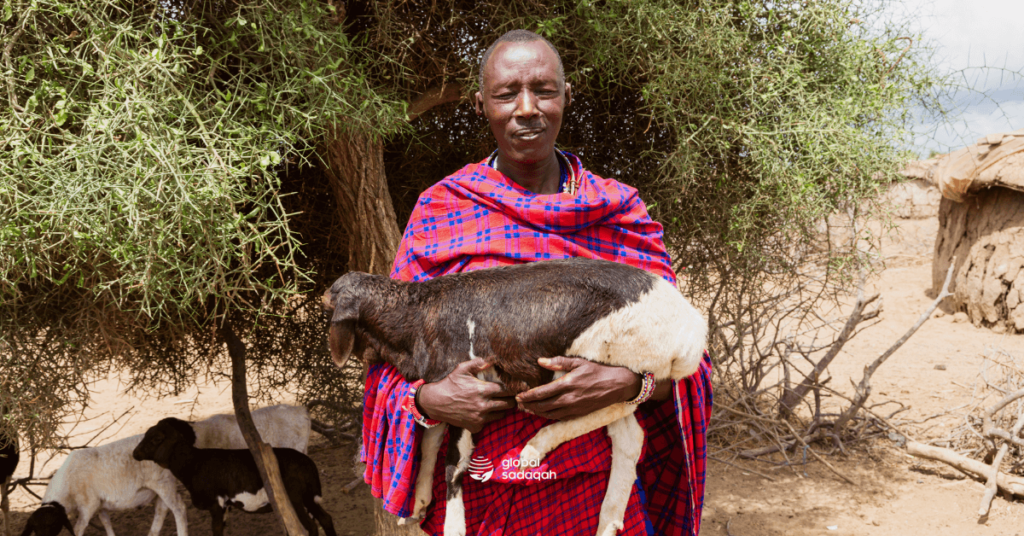
As part of the qurbani guide 2022, we have researched and found that the majority of the scholars including the Shafi’i, Maliki, and Hanbali schools, offering qurban (korban), or sacrifice is sunnah muakkadah. It is a highly recommended act for Muslims who could afford it. It is stipulated that the one who offers it should be independent of means, in that the price of the udhiyah is surplus to his needs and the needs of those on whom he spends.
Abu Hurairah narrated that the Prophet Muhammad ﷺ said:
“Whoever can afford it, but does not offer a sacrifice, let him not come near our prayer place.” [Sunan Ibn Majah]
With that said, there are different schools of thought on who qurban is wajib on. To avoid any doubt, consult your local Imam for confirmation.
In addition, qurban is prescribed for all members of a family, including children. The Prophet ﷺ said: “The people of each household should offer an udhiyah every year.” [Ahmad] Therefore, it is the responsibility of parents to complete qurban contributions on behalf of their children.
The basic principle behind this is that it is required at the appointed time, for one who is alive on behalf of himself and the members of his household. Additionally, he may include in the reward whoever he wishes, living or dead. The Sunnah is for a person to include the members of his household, living and dead, in his qurban. And when he slaughters it, he should say, “Allaahumma haadha ‘anni wa ‘an aali bayti (O Allah, this is on behalf of myself and the members of my household”. The person does not have to make a separate sacrifice on behalf of every individual family member or the deceased. One sacrificial animal suffices for the entire family.
Abu Ayyub al-Ansari reported: “At the time of the Messenger of Allah ﷺ, a man would sacrifice a sheep on behalf of himself and the members of his household, and they would eat from it and give some to others.” [Tirmidhi]
When must Qurban be completed?
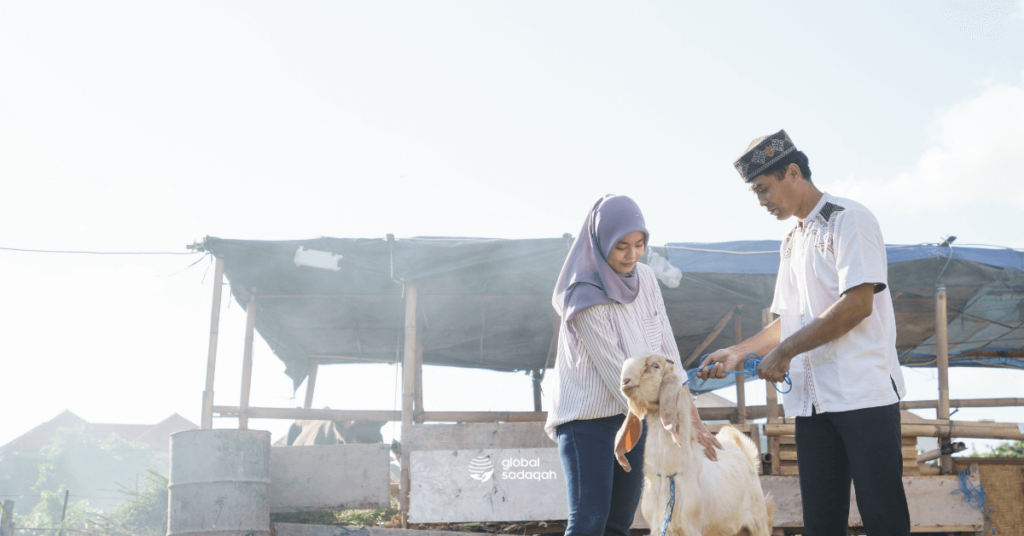
Never leave your qurban to the very last minute. Gain peace of mind by settling your qurban obligation on our platform seamlessly and immediately.
If you are doing the sacrifice by yourself, it’s important to remember that the time for offering the sacrifice begins after the Eid prayer on Eid-al-Adha and ends when the sun sets on the 13th of Dhul Hijjah.
More specifically, the time is from after the prayer and khutbah of Eid—not from when the time for the prayer and khutbah starts—until before sunset on the last of the days of Tashreeq, which is the 13th day of Dhul-Hijjah.
The Prophet ﷺ said: “Whoever sacrifices before the prayer, let him repeat it.” [Bukhari]. Ali said: “The days of Nahr (Sacrifice) are the day of al-Adha and the three days following it.”
According to Islamic guidelines, those making qurban must either sacrifice an animal by themselves or make a donation equivalent to the value of a sacrificial animal on the 10th, 11th and 12th days of Dhul Hijjah (after special Eid prayers on the first day).
The money from qurban donations goes towards purchasing and rearing animals so they can be prepared for sacrifice later on before being distributed as fresh meat to poor communities as a gift for the Eid al-Adha celebrations.
If you sacrificed an animal before the three designated days, then you must perform your qurban once more during the Eid ul-Adha celebrations for your qurban to be considered valid.
At GlobalSadaqah, you will be able to donate for qurban up until 16 July 2021. By the way, with the first 10 days of Dhul Hijjah upon us, we highly recommend that you take part in our 2:1 matching campaign to triple your rewards.
What that means is if you donate MYR 50, we will match and double it, so your total donation will be MYR150!
Only donations to one of the following three campaigns will be matched 2:1 by us:
Help Refugee Children Secure a Brighter Future
Building Malaysia: Sponsoring Needy Students Get Educated
Help Provide Disinfecting Services to Covid-19 Affected Public Areas
You donate, we donate and together we will triple the impact inshallah. This campaign is valid until 11 July 2021.
How is Qurban meat distributed?
The first is by saving a third for the person who made the qurban donation. The second is to give a third of the meat to the donor’s family or friends and finally, giving the final third to the vulnerable, hungry and less fortunate. This was the opinion of Abdullah Ibn Mas’ud and Ibn Umar.
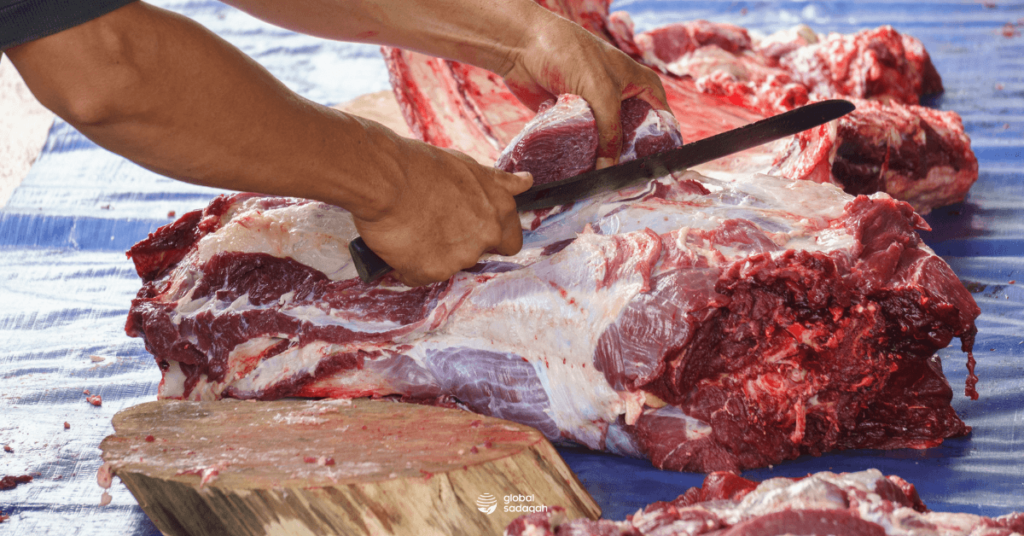
It is not permissible to sell anything from its meat, fat or skin.The Prophet ﷺ said: “Whoever sells the skin of his udhiyah, there is no udhiyah for him (i.e., it is not counted as udhiyah).” [Saheeh al-Jaami’]. Additionally, the butcher should not be given anything as a reward or payment, because Ali said: “The Messenger of Allah ﷺ commanded me to take care of the sacrifice and to give its meat, skin and raiment ( covering used for protection ) in charity, and not to give anything of it to the butcher as a compensation. He said, ‘We will give him something from what we have.’” [Agreed Upon].
Related: 5 Things You Need to Know about Qurban (Korban/Udhiyah) Abroad
What animals can be sacrificed for Qurban
Not all animals can be used as a sacrifice. For starters, the animals must be four-legged, and sometimes it depends on the availability of such animals in your country or the country that you signed up to carry out your qurban rituals.
For instance, camels won’t be available in Southeast Asian countries like Malaysia and Indonesia. If you live in either, you may opt to sacrifice a goat or a cow. Other animals that can be used for qurban include sheep and camels.
Besides the type, animals must also meet other requirements for it to be eligible. First, the chosen animal must be in pink health and condition. Animals that are weak, sick, physically disabled, blind, have broken horns or no teeth, and are still young, are ineligible. If an animal gives birth, its offspring should be sacrificed along with it.
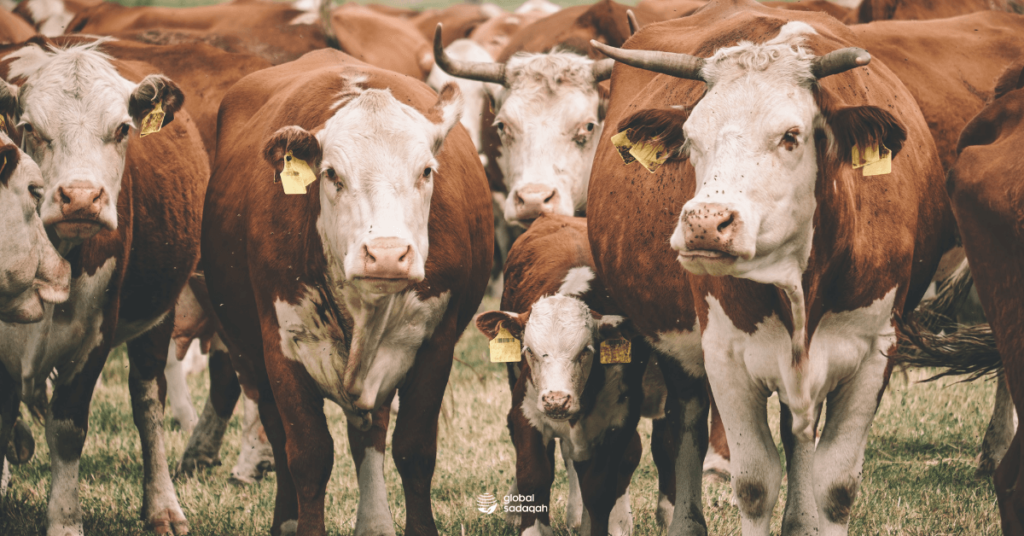
The age of the animal should meet a minimum of:
- Six months in age for lamb
- One year in age for sheep and goats
- Two years in age for cows and buffalo
- Five years in age for camels
How to perform Qurban?
During qurban, animals are sacrificed in a very specific way. First, the person executing the qurban ritual must say the Takbeer at the time of sacrifice to ensure it is successful and acceptable. Bismillahi Allahu Akbar is the word that the person must say at that moment. However, it is not necessary to say these words aloud.
One can also say: Bismillah, wa Allahu akbar, Allahumma haadha minka wa laka, haadha ‘anni (or if it is being offered on behalf of someone else, haadha ‘an [fulaan]), Allaahumma taqabbal min [fulaan] wa aali [fulaan].
In the name of Allah, Allah is most great. O Allah, this is from You and to You. This is on my behalf (or if it is being offered on behalf of someone else, This is on behalf of [So and so]). O Allah, accept (this sacrifice) from [So and so] and the family of [So and so]) – here he should mention his name instead of [fulaan] or [So and so].
What is obligatory here is to say Bismillah; the rest are recommended but aren’t obligatory.
Anas said: The Prophet ﷺ sacrificed two horned rams that were white speckled with black. He slaughtered them with his own hand, said Bismillah and Allahu Akbar, and put his foot on their necks. [Bukhari]
Besides that, other rules as part of the slaughtering process include:
- Slaughter with a sharp knife – dull knives may slow the killing process and inflict unnecessary pain to the animals
- Don’t sharpen knives in front of the sacrificial animal
- Don’t slaughter one animal in front of another animal
- Don’t skin an animal until the body is entirely cold (completely dead)
If you intend on giving qurban, don’t cut your hair or nails from the start of Dhul Hijjah up until the sacrifice is done. The wisdom behind this prohibition is because the one who is going to offer a sacrifice is like the one who is in ihram for Hajj and Umrah with regard to some rituals, which is the offering of a sacrifice in order to draw a person closer to Allah.
Prophet Muhammad ﷺ said, “When you see the new moon of Dhul Hijjah, and one of you desires that he offer a sacrifice, then let him keep [i.e. not cut] his hair and nails.” [Sahih Muslim]
This prohibition applies to the one who is offering the sacrifice, and does not extend to his wife, children, or rest of the family unless one of them is offering a sacrifice on his or her own behalf. A common misconception is that this applies to the one carrying out the actual slaughter. In reality, the ruling applies to the one who intended the sacrifice, whether he or she delegates someone else to do the actual slaughter or not does not matter.
The Prophet ﷺ used to sacrifice on behalf of the family of Muhammad, and it was not reported that he forbade them to remove anything of their hair or nails.
How is a Qurban volume decided?
Here’s a simple guideline that you can follow:
1 sheep or goat = 1 qurban
1 cow = 7 qurbans (1 qurban – 1/7th of the share of the cow)
But don’t feel like you can’t give more because you can always give as many qurban shares as you like. The more you give, the better.
Many also dedicate qurban for other members of their family and in memory of loved ones that have passed away. On GlobalSadaqah, you can surprise your loved ones by donating on their behalf.
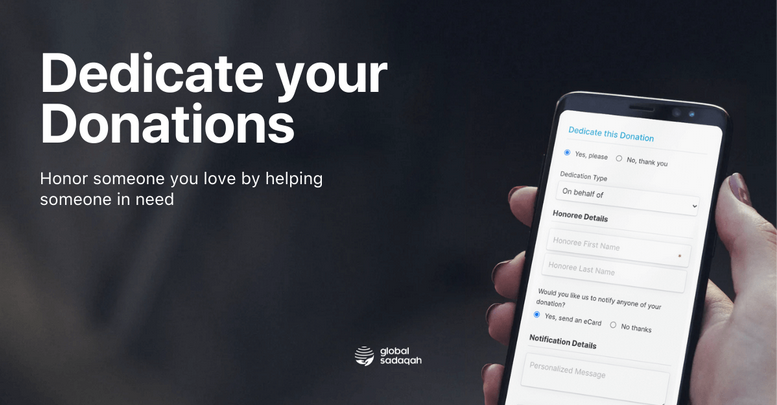
How much does Qurban cost?
The cost for qurban varies by country, so it’s best to check with your provider or local mosque.
If you’re thinking about donating via our platform, there’s no harm in checking out this article we did on the 19 qurban campaigns that are running on our platform. The article also includes the prices for each campaign which goes from as low as RM311 to as high as RM1,300 depending on the type of meat as well as the country you are donating to.
The varying costs reflect the local prices of the meat. If you wanted to save on money, you could also do the qurban by yourself if you have a farm of animals; plus it minimizes the carbon footprint.
Many people, however, choose to pay for an offering as it’s also a way of giving back to their local communities. You can work with your local mosque and community to do this. However, due to the pandemic, many people have chosen to complete their qurban online as it is much safer, secure, faster and more seamless.
Related: 8 Reasons why you should do your 2021 Qurban online with GlobalSadaqah
Different charities will charge different prices due to the different suppliers, implementation methods and costs that they all have.
Get your qurban sorted on GlobalSadaqah, a verified platform that works with trusted charity partners with eputable backgrounds and a good track record of managing charity and qurban initiatives.
With Eid-ul-Adha just two weeks away, it is important for Muslims who will be performing qurban for the first time this year to complete it properly and in accordance with the Shariah.
Let’s pray that Allah ends the COVID-19 pandemic soon and allow us to perform Hajj next year Inshallah. May he accept our good deeds in the month of Dhul Hijjah and our sacrifice this qurban season. Ameen.
If you have not offered qurban this year, check out the various qurban campaigns running on our website. With just a few clicks, you can help our vulnerable and needy brothers and sisters across the globe. Our Global Qurban Campaign ends on 16 July 2021.
With your contribution, together, we can help provide hope to our Islamic brothers and sisters across the globe. Contribute today and make a difference.
